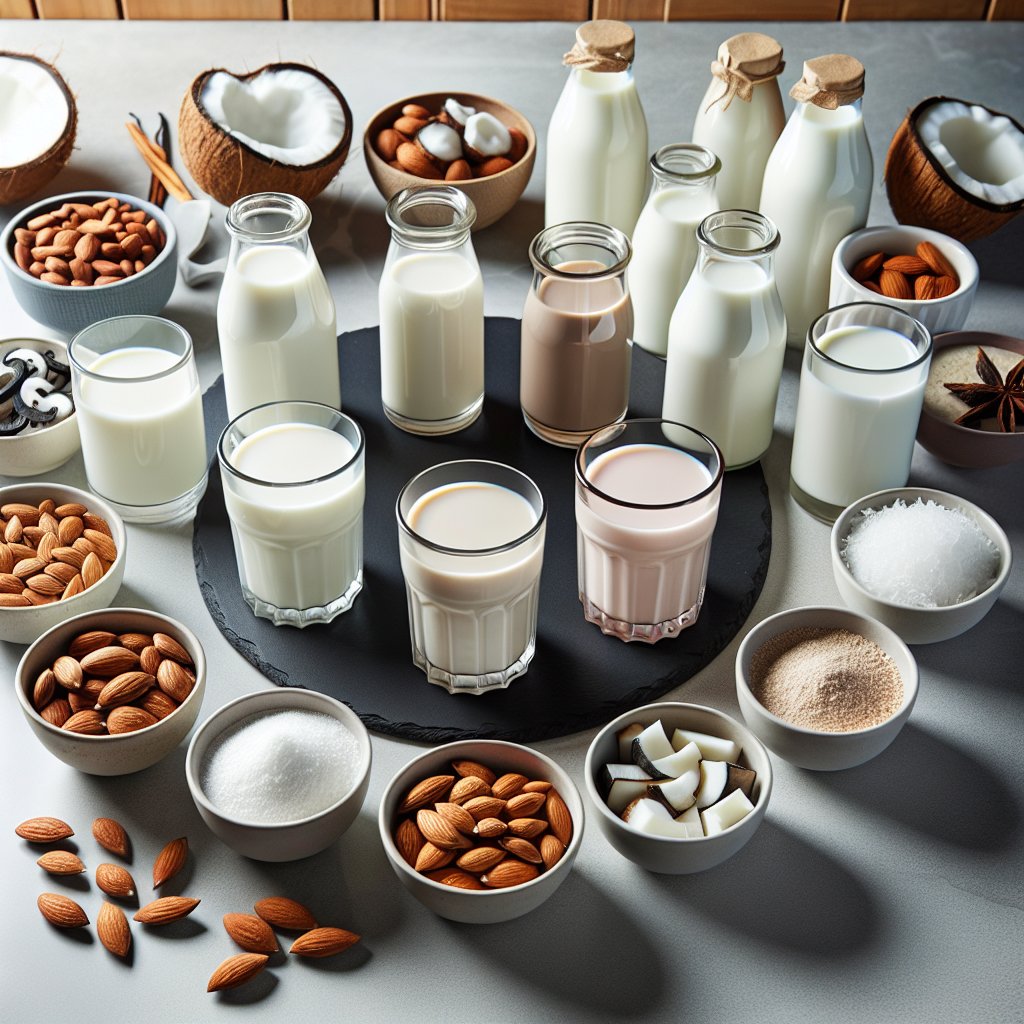Can You Have Milk on a Keto Diet? Unveiling the Low-Carb Truth About Including Milk in Your Keto Lifestyle!
Can You Have Milk on a Keto Diet?
Explaining the Keto Diet and Its Focus on Low-Carb, High-Fat Foods
Hey there, all you keto enthusiasts! Today, we’re diving deep into the world of the ketogenic diet and answering the burning question: can you have milk on a keto diet? If you’re eager to understand the ins and outs of this popular low-carb, high-fat lifestyle and whether milk fits into it, you’ve come to the right place.
So, what exactly is the keto diet? Well, in a nutshell, it’s a low-carb, high-fat diet that offers a plethora of health benefits. When you follow a ketogenic diet, your body enters a state called ketosis, in which it becomes incredibly efficient at burning fat for energy. This leads to weight loss, improved mental clarity, and a surge in energy levels. The key principle is to drastically reduce your carb intake and replace it with healthy fats.
The focus on low-carb, high-fat foods is at the heart of the keto diet. By significantly reducing your carb intake and incorporating moderate amounts of protein, your body switches from using glucose as its primary source of energy to using fats. This metabolic shift leads to the production of molecules called ketones, which become your body’s main energy source.
Research has shown that the keto diet can aid weight loss, improve insulin sensitivity, and even enhance cognitive function. Plus, many followers report feeling satiated and content, thanks to the consumption of satisfying, wholesome foods.
Adopting a keto lifestyle means embracing nutrient-dense, whole foods while bidding farewell to processed carbs and sugar-laden treats. It’s all about filling your plate with leafy greens, avocados, nuts, seeds, and healthy fats such as olive oil and fatty fish.
The science-backed benefits of the keto diet make it a compelling choice for anyone looking to revamp their health and nutrition. And now that we’ve brushed up on the core principles of the keto diet, let’s move on to the intriguing question of whether milk aligns with this low-carb, high-fat way of eating. Stay tuned as we unravel the truth about including milk in your keto lifestyle!

Discussing the Potential Health Benefits of Following a Keto Diet
Embarking on a keto diet can be a transformative journey that not only helps with weight loss but also offers a range of potential health benefits. Let’s dive into the exciting ways a keto diet can positively impact your well-being!
Weight Loss and Improved Body Composition
Research has shown that following a ketogenic diet can be effective for weight loss and improving body composition. A study published in the Journal of Clinical Endocrinology & Metabolism found that individuals following a ketogenic diet experienced greater weight loss compared to those on a low-fat diet. The high-fat, low-carbohydrate nature of the keto diet can lead to a significant reduction in body fat percentage, making it an appealing option for those looking to manage their weight.
Stabilized Blood Sugar Levels
For individuals with type 2 diabetes or those looking to manage their blood sugar levels, the keto diet may offer promising benefits. A review published in Diabetes Therapy concluded that following a ketogenic diet could result in improved glycemic control and reduced reliance on diabetes medication for some individuals. By minimizing carbohydrate intake and relying on fat for energy, the keto diet can help stabilize blood sugar levels, providing a valuable tool for diabetes management.
Improved Heart Health
Contrary to traditional beliefs, the keto diet may have favorable effects on heart health. A study in the American Journal of Clinical Nutrition demonstrated that following a keto diet led to significant improvements in cardiovascular risk factors, including reduced levels of triglycerides, increased levels of HDL (good) cholesterol, and improvements in blood pressure. These findings indicate that the keto diet may offer benefits for heart health beyond just weight loss.
Enhanced Mental Clarity and Focus
One of the most intriguing benefits of following a keto diet is the potential for enhanced mental clarity and focus. Research published in the Journal of Neurochemistry suggests that the ketones produced during ketosis may provide a more efficient and stable source of energy for the brain, leading to improved cognitive function. Many individuals on a keto diet report feeling more mentally alert and focused, making it an attractive option for those seeking to optimize their brain function.
As you can see, the potential health benefits of following a keto diet extend far beyond weight loss. From improved blood sugar control to enhanced mental clarity, the keto diet offers a compelling array of advantages for overall well-being.
Can You Have Milk on a Keto Diet?
So, you’ve decided to embark on a keto lifestyle, but the question remains: can you have milk on a keto diet? The role of milk in a ketogenic diet has been a topic of debate among followers of this low-carb, high-fat eating plan. Let’s delve into the science to uncover the truth about including milk in your keto lifestyle.
Analyzing the Role of Milk in a Keto Diet
Milk, often touted for its nutritional value, does contain lactose, a naturally occurring sugar. A cup of cow’s milk can provide around 12 grams of carbohydrates, primarily in the form of lactose. For many individuals following a strict keto diet, this high carbohydrate content might be a cause for concern.
However, the good news is that moderate consumption of milk can still be compatible with a keto lifestyle. Research published in the “Nutrients” journal suggests that incorporating small amounts of milk or cream in a keto diet may not significantly impact blood glucose and ketone levels, making it possible for some individuals to include milk in their daily carb count without hindering their state of ketosis.
In conclusion, while milk does contain carbs, you can still have milk on a keto diet as long as you do so in moderation and factor the carb content into your daily intake. Opt for unsweetened nut milk or consider small servings of whole milk or heavy cream to complement your ketogenic meals without derailing your progress. It’s all about finding the right balance to suit your individual needs while reaping the nutritional benefits milk has to offer.
Types of Milk on Keto: Can You Have Milk on a Keto Diet?
One question that often arises for individuals following a ketogenic diet is whether they can still enjoy milk and its alternatives. Let’s compare different types of milk, such as whole milk and almond milk, in terms of keto-friendliness to uncover the low-carb truth about including milk in your keto lifestyle.
Whole Milk on Keto
Whole milk is a staple in many households, known for its rich and creamy texture. However, it is relatively high in carbohydrates, containing around 12 grams of carbs per cup. For individuals following a strict ketogenic diet, this amount of carbs can quickly add up and may not align with their low-carb goals. Therefore, whole milk is not the most keto-friendly option.
Almond Milk on Keto
On the other hand, almond milk is a popular alternative for those seeking a low-carb milk option. Unsweetened almond milk typically contains only 1-2 grams of carbs per cup, making it a much more keto-friendly choice compared to whole milk. It’s also naturally rich in vitamins and minerals, such as vitamin E, which can support overall health and well-being.
When comparing whole milk and almond milk in terms of keto-friendliness, almond milk emerges as the clear winner. Its significantly lower carb content makes it a great option for those looking to enjoy milk while staying within their carb limits on a ketogenic diet.
Another benefit of almond milk is its versatility. It can be used in various keto-friendly recipes, such as smoothies, sauces, and baked goods, providing a creamy texture without the additional carbs found in whole milk.
Ultimately, when it comes to the question, “Can you have milk on a keto diet?” the answer depends on the type of milk you choose. While whole milk may not be the best option due to its higher carb content, almond milk offers a keto-friendly alternative that allows you to enjoy milk while staying within your low-carb limits.
So, for all the fellow keto enthusiasts out there, rejoice in the fact that there are low-carb milk alternatives available, such as almond milk, that can seamlessly fit into your keto lifestyle without compromising your carb goals.
If you are craving the rich, creamy goodness of milk in your keto journey, consider making the switch to almond milk and savor your favorite milk-based drinks and dishes guilt-free!

Can You Have Milk on a Keto Diet? Unveiling the Low-Carb Truth About Including Milk in Your Keto Lifestyle!
<h3>Nutritional Value of Milk on Keto</h3>
Ah, milk – a staple in many households, and a drink that often evokes feelings of comfort and nourishment. But, can you have milk on a keto diet? Let's explore the nutritional content of milk and its impact on ketosis.
Whether you prefer whole, skim, or plant-based alternatives like almond or coconut milk, it's crucial to consider the carbohydrate content when incorporating milk into your ketogenic lifestyle. While cow's milk contains natural sugars in the form of lactose, it also provides essential nutrients that could be beneficial for those on a keto diet.
In a standard 1-cup serving of whole milk, you'll find approximately 12g of carbohydrates, with 8g being from sugars. This carb content may seem high for individuals aiming to stay within a low-carb range on a keto diet. However, it's important to remember that these numbers can vary based on the type and brand of milk you choose. For instance, unsweetened almond milk typically contains only 1-2g of carbohydrates per serving, making it a popular choice for those following a keto lifestyle.
With its protein content of around 8g per cup, milk can contribute to your daily protein intake, a crucial factor for maintaining lean muscle mass and supporting metabolic function during ketosis. Additionally, milk is an abundant source of essential nutrients, including calcium, vitamin D, and B vitamins, which are vital for bone health, immune function, and overall well-being.
Some studies have also suggested that the consumption of dairy products, including milk, may have a positive impact on weight management and body composition, potentially aiding in fat loss. Research published in the American Journal of Clinical Nutrition found that high dairy consumption was associated with a lower prevalence of obesity.
In summary, while the carbohydrate content of traditional cow's milk may be too high for some individuals following a strict ketogenic diet, there are lower-carb milk alternatives that can be incorporated into a keto lifestyle. These alternatives still offer valuable nutrients and may even have potential benefits for weight management. Consulting with a healthcare professional or nutritionist will help you determine the best milk options to support your unique keto journey.
Alternatives to Milk on Keto
So, can you have milk on a keto diet? The answer is a bit complex. While cow’s milk contains natural sugars, such as lactose, which can make it higher in carbs, there are still plenty of milk alternatives that are low in carbs and suitable for a keto lifestyle. Let’s explore some great options for those looking to enjoy milk-like beverages while staying within their daily carb limits.
Almond Milk
Almond milk is a fantastic alternative to cow’s milk on a keto diet. It’s naturally low in carbs and provides a creamy texture that’s similar to dairy milk. With just 1-2 grams of carbs per serving, unsweetened almond milk is a great choice for your keto lifestyle. Additionally, almond milk is often fortified with calcium and vitamin D, making it a nutritious option as well.
Coconut Milk
Coconut milk is another wonderful option for those on a keto diet. It’s creamy, rich, and has a deliciously tropical flavor. Make sure to choose unsweetened coconut milk to keep the carb content low. With only 1-2 grams of carbs per serving, it’s a great addition to your keto pantry. Coconut milk is also high in healthy saturated fats, which can be beneficial for ketosis.
Macadamia Milk
If you’re looking for a decadent, creamy milk alternative, macadamia milk is a great choice. With zero net carbs and a rich, buttery flavor, it’s a luxurious option for your keto lifestyle. Macadamia milk is also a good source of monounsaturated fats, which have been linked to various health benefits, including improved heart health.
Hemp Milk
Hemp milk, made from hemp seeds, is a nutritious and keto-friendly milk alternative. It contains omega-3 and omega-6 fatty acids, has around 1-2 grams of carbs per serving, and provides a nutty flavor that many enjoy. Hemp milk is also rich in protein, making it a great addition to a keto diet that may sometimes lack in protein-rich options.
So, while cow’s milk may not be the best choice for a keto diet due to its higher carb content, there are plenty of delicious and low-carb milk alternatives to enjoy. Experiment with these options to find your favorite, and don’t be afraid to get creative in the kitchen!
Overall word count: 388
Providing creative ways to include milk in keto-friendly recipes
When it comes to the keto diet, many people wonder if they can have milk. The answer is yes, but it’s important to choose the right type of milk and consume it in moderation. Luckily, there are creative and delicious ways to include milk in your keto-friendly recipes that will keep you satisfied while staying within your carb limits.
Let’s explore some fantastic options for incorporating milk into your keto meals:
Unsweetened Almond Milk in Smoothies
One of the easiest ways to include milk in your keto diet is by using unsweetened almond milk in your smoothies. Almond milk is low in carbs and can add a creamy texture to your favorite blended beverages. It’s a great way to enjoy the flavor of milk without worrying about going over your carb limit.
Coconut Milk for Creamy Curries
Coconut milk is a fantastic alternative to regular milk in keto cooking. It’s high in healthy fats and adds a rich, creamy texture to dishes like curries and soups. Plus, it’s low in carbohydrates, making it an excellent choice for those following a ketogenic lifestyle.
Heavy Cream in Coffee
If you enjoy a splash of milk in your morning coffee, consider using heavy cream instead. Heavy cream has a negligible amount of carbs and adds a luscious, decadent touch to your cup of joe. It’s a simple and delicious way to satisfy your milk craving without compromising your keto goals.
Macadamia Nut Milk for Baking
For keto-friendly baking, macadamia nut milk can be a game-changer. It has a rich, buttery flavor and is low in carbs, making it an ideal milk substitute in recipes for cakes, muffins, and pancakes. It’s a versatile option that can elevate your baking endeavors while keeping you in ketosis.
By incorporating these creative milk alternatives into your keto meals, you can enjoy the taste and versatility of milk while reaping the benefits of a low-carb, high-fat diet.

Precautions for Consuming Milk on Keto
While milk is a staple in many diets, it can pose some concerns when it comes to following a keto lifestyle. Here are a few things to consider if you’re thinking about including milk in your keto diet:
Lactose Content
One of the primary issues with consuming milk on a keto diet is its lactose content. Milk contains a natural sugar called lactose, which can affect blood sugar levels and potentially hinder ketosis. For individuals who are sensitive to lactose or are trying to maintain a state of ketosis, consuming regular milk could pose challenges.
Carbohydrate Count
Another concern with incorporating milk into a keto diet is its carbohydrate count. Although milk is nutrient-dense and provides essential vitamins and minerals, it also contains a notable amount of carbohydrates. A single cup of milk can contain around 12 grams of carbohydrates, which can significantly impact daily carb intake, especially for those following a strict keto protocol.
Insulin Response
Research shows that the insulin response to dairy consumption varies among individuals. While some people experience a significant increase in insulin levels after consuming dairy, others may have a more moderate response. This individual variability suggests that for some, the insulinogenic effect of milk could potentially interfere with the metabolic state of ketosis.
Alternative Options
Fortunately, there are alternative options to consider if you’re hesitant about including milk in your keto diet. Unsweetened almond milk, coconut milk, or macadamia milk are low-carb, keto-friendly alternatives that can be used in various recipes and beverages. These dairy substitutes offer a creamy texture and can complement your keto lifestyle without the concerns associated with traditional cow’s milk.
Ultimately, while milk can be consumed in moderation on a keto diet, it’s essential to be mindful of its impact on individual carbohydrate tolerance and insulin response. Exploring alternative milk options may provide a way to enjoy creamy textures and flavors while staying true to your low-carb, high-fat keto journey.
Conclusion: Can You Have Milk on a Keto Diet?
After delving into the low-carb truth about including milk in your keto lifestyle, it is evident that milk can be a part of a ketogenic diet in moderation but with some considerations. While milk contains natural sugars in the form of lactose, leading to a higher carb content, it also offers essential nutrients crucial for overall health. The key lies in making informed choices and being mindful of portion sizes.
It’s important to opt for unsweetened, full-fat dairy options such as whole milk or heavy cream to minimize the carbohydrate intake. These choices provide a rich source of healthy fats and limited carbohydrates, making them a suitable addition to your keto meal plan. Additionally, consuming milk in its whole form helps slow down the absorption of lactose, reducing the impact on blood sugar levels.
Final Recommendations
Here are some key recommendations for including milk in a keto diet:
- Choose full-fat, unsweetened milk options to minimize carbohydrate intake and maximize healthy fats.
- Pay attention to portion sizes and track your milk consumption to stay within your daily carb limit.
- Consider alternatives like almond milk or coconut milk, which tend to be lower in carbs, if you prefer a non-dairy option.
- Be mindful of any individual responses to milk and how it affects your ketosis and overall well-being.
Ultimately, while milk can be included in a keto diet, it’s essential to strike a balance and monitor your intake to ensure you remain within your macronutrient targets. With the right approach and moderation, you can enjoy the nutritional benefits of milk while staying in ketosis.


